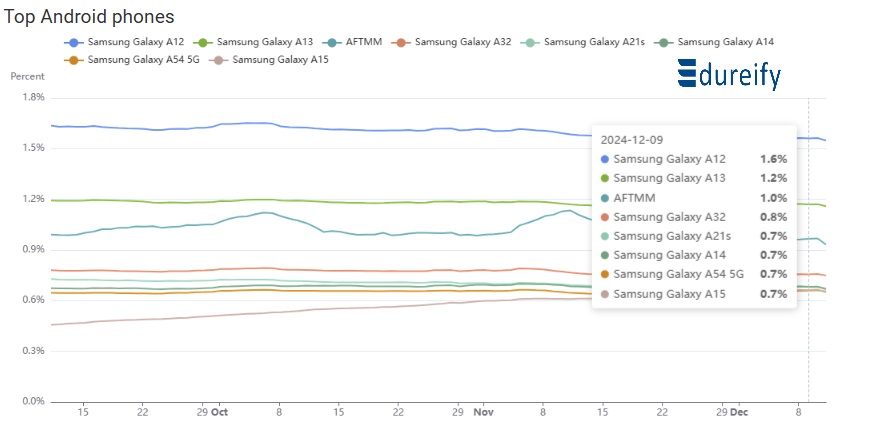if you want to become an Android Developer, The demand for Android developers is growing rapidly as Android continues to dominate the global mobile market. With over 3 million apps published on the Google Play Store and a global market share of 71.6% by the end of 2024, Android remains the leading operating system powering millions of devices worldwide.
This widespread usage creates endless opportunities for developers to create innovative applications for smartphones, tablets, smartwatches, and more. As the Android ecosystem continues to expand, the need for skilled Android developers has never been greater, making it an ideal time to pursue a career in Android development.
Android is more than just a mobile operating system. It’s a comprehensive suite of software that includes middleware, essential mobile applications, and an operating system based on Linux. This platform is not just limited to mobile devices like smartphones and tablets; it extends to other devices such as smartwatches, televisions, laptops, e-readers, and set-top boxes.
One fascinating aspect of Android’s history is its evolution. Over the years, Android has released several versions with codenames ranging from Aestro, Blender, and Cupcake to Donut, Eclair, and Froyo, all the way up to Ice Cream Sandwich, Jelly Bean, KitKat, and Lollipop. These versions illustrate Android’s continuous growth and innovation.
Android’s flexibility and open-source nature have contributed to its success. Initially created by Android Inc. and later acquired by Google in 2005, Android has become one of the most widely used operating systems. Today, there are over 3.3 million apps available on the Google Play Store. Despite the competition, with iOS holding only 15% of the global market share, Android continues to dominate the mobile OS market.
If you’re considering a career as an Android developer, now is the perfect time to get started. The demand for Android developers is increasing as more devices adopt the operating system. Let’s dive into how you can learn Android development and start your journey.
How to Learn Android: The First Step Towards Becoming an Android Developer
To become proficient in Android development, you’ll need to learn key programming languages, tools, and frameworks. The two primary languages for Android programming are Java and Kotlin, along with XML (Extensible Markup Language) for the front-end design. Let’s explore these in more detail.
Kotlin or Java: Which One Should You Choose?
The first challenge for new Android developers is deciding whether to learn Kotlin or Java. So, let’s clear up the confusion:
- Kotlin: This is the official language for Android development, as declared by Google. Kotlin is the preferred language for developing Android apps due to its simplicity, speed, and powerful features. It’s also the most supported language by Google, and many of the apps on the Play Store are built with Kotlin. Compared to Java, Kotlin reduces boilerplate code and eliminates some common issues, such as null pointer exceptions. This makes Kotlin easier to use and less error-prone.
- Java: While Kotlin is now the official language, it has been the backbone of Android development for years. Use of Java is in the Android operating system itself and the software that powers it. not only that java is a highly versatile language and can be used for other platforms like Windows, Linux, and web development. However, Java requires more boilerplate code and uses semicolons at the end of each line, which some developers find cumbersome.
Ultimately, Kotlin is the recommended choice for new Android developers, but Java remains widely used and supported. Learning both languages can be beneficial, as Java continues to be a popular language in many industries.
Roadmap to Android Development
Now that you understand the key programming languages, let’s break down the roadmap to Android development. This step-by-step guide will help you navigate the learning process effectively.
1. Learn Programming Basics
Before diving into Android development, it’s essential to have a solid understanding of programming fundamentals. Start with:
- Java: A good grasp of Java is essential, especially if you’re planning to work with older Android apps or need to understand how Android’s underlying components work.
- Kotlin: If you’re focusing on Kotlin, ensure you learn its syntax, features, and best practices.
- XML: XML is used for designing the user interface and layouts of Android apps. Understanding XML is critical for building interactive, responsive designs.
2. Master Android Studio
After you’re comfortable with programming languages, it’s time to get familiar with the Android Studio. Android Studio is the official Integrated Development Environment (IDE) for Android development. It was created using JetBrains’ IntelliJ IDEA platform and offers tools that are essential for building, testing, and debugging Android apps. It is crucial to master Android Studio as it will be your primary tool for developing Android apps.
3. Build Your First Android App
Once you are comfortable with the basics, the next step is to build your first Android app. Start with simple projects, such as a calculator app, a to-do list, or a weather app. This will help you practice writing code, designing interfaces with XML, and testing your apps.
4. Learn Android Frameworks and APIs
As you continue to improve your skills, you should start learning about Android frameworks, APIs, and libraries. Understanding these tools will allow you to build more advanced and feature-rich apps. Common frameworks include the Android SDK (Software Development Kit) and Jetpack libraries.
5. Keep Practicing and Stay Updated
The world of Android development is always evolving, with new tools, libraries, and techniques emerging regularly. It’s important to keep practicing and stay updated with the latest Android trends and updates. Download the BootSelf app to get started with Android development.
Conclusion: Start Your Journey as an Android Developer
Android development is an exciting and rewarding field with endless growth opportunities. Whether you choose to learn Kotlin or Java, mastering the core principles of Android programming is key to your success. By following the roadmap above, you’ll be well on your way to becoming an Android developer.
Remember, the key to success in Android development is continuous learning and practice. As the Android ecosystem continues to grow, there will always be new challenges and opportunities for developers. So, start your journey today and become a part of the ever-expanding Android developer community.
With dedication, persistence, and the right tools, you can develop the skills necessary to build innovative Android apps and contribute to the global mobile ecosystem.
Master Your Coding Skills with BootSelf AI
If you're looking to enhance your coding abilities and upskill in artificial intelligence, look no further than the BootSelf AI app. This innovative platform provides AI-based coding lessons that are tailored to your individual learning pace.
Available on both iOS and Android, you can download the BootSelf AI app and start mastering coding skills today:








